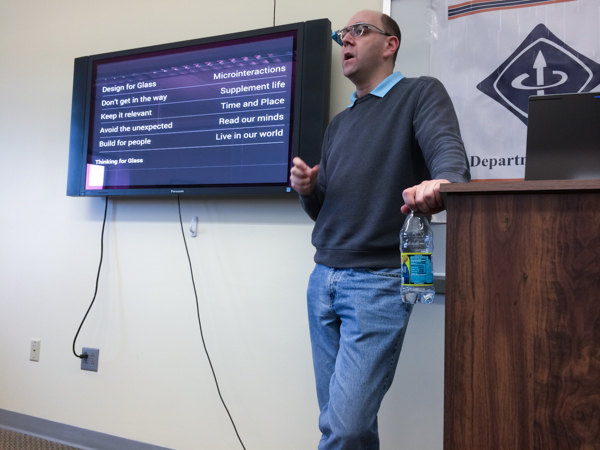

On Thursday April 17, the Google Developer Group (GDG) Hudson Valley held its first meeting in Resnick Engineering Hall. In an audience of more than 60 students and faculty members, only two members were sporting Google Glass, and only one wearer was a student.
Joining the two wearers to give a talk was Google Developer Expert Allen Firstenberg, who headlined the event to speak about Google’s latest tech endeavor.
“How many of you know anything about Google Glass?” Firstenberg said. Less than 10 members raised their hands. “Google Glass has only been available to a group of individuals known as the Explorers for just over a year now,” Firstenberg said.
Firstenberg is the senior project engineer at Objective Consulting and a Google Glass Explorer, part of an initial group of people outside Google “who are using Glass in the real world, developing for it, trying it out, seeing what its problems are, exploring in some ways how it can be used, how its practical in the real world.”
Firstenberg works with other developers to help them produce their tools for Glass, help them to use Glass and integrate them with other Google products. By doing so, he helps Google understand what it is that developers need more of, with the goal of creating great Glassware (applications that work with Glass).
Google Glass, as defined by Firstenberg, is an ultra-personal, wearable computing device.
“It displays in your peripheral vision — it’s not always on, it’s not always distracting, but it sits in the upper corner of my peripheral vision where I can glance at it if I need to glance at it for some reason,” he said.
According to Firstenberg, Google Glass has bone-conduction audio that literally beams a “chirp” into his skull, letting him know if he needs to pay attention to it. It also has a camera mounted on the front, allowing for photos and short videos, and a microphone for voice commands and head-motion detectors to activate the device. It can also send and receive text messages when connected to Android devices and will soon support iOS.
“Right now it’s very deliberate to make sure that you need to take a conscious action for [Glass] to be listening, mostly because [Google] wanted to reassure people that they’re not going to be wire-tapped,” Firstenberg said. “Glass needs to live in the world we live in. We shouldn’t have to make major accommodations for Glass. It’s a fundamental shift in how we think about using our computing devices.
Adjunct Professor Nitya Narasimhan of the electronic and computer engineering department is a co-organizer for GDG New York and has high hopes for GDG Hudson Valley.
“It’s a community around developing applications and solutions that primarily focuses on Google technologies, but really Google isn’t everything,” Narasimhan said. “We’re looking to teach people and keep them aware of what’s going on in mobile, web, cloud and wearable.”
Her goal is to run code labs during the summer, encourage people to learn to code and to bring more guest speakers like Firstenberg to the college.
“We’re trying to use the great amount of interest in the field and bring speakers to the Hudson Valley. I’m very interested in seeing students attend these events—especially people who think they don’t know coding, because everyone can do it,” Narasimhan said.
